Global Artificial Intelligence (AI) Market Size, Share, Industry Analysis Report By Component (Hardware, Software, Services), By Deployment (On-Premise, Cloud-based), By Technology (Machine Learning (ML), Natural Language Processing (NLP), Computer Vision, Others), By Industry (Healthcare, BFSI, Manufacturing, Retail and eCommerce, Media & Entertainment, Transportation, Automotive, Education, Others), By Region and Companies - Industry Segment Outlook, Market Assessment, Competition Scenario, Trends and Forecast 2025-2034
- Published date: Jan. 2026
- Report ID: 59640
- Number of Pages: 225
- Format:
-
keyboard_arrow_up
Quick Navigation
- Report Overview
- Key Takeaways
- Drivers Impact Analysis
- Risk Impact Analysis
- Restraint Impact Analysis
- US AI Market Size
- Component Analysis
- Deployment Analysis
- Technology Analysis
- Industry Segment Analysis
- Investor Type Impact Matrix
- Technology Enablement Analysis
- Top Growth Factors
- Key Trends and Innovations
- Key Market Segments
- Driver Analysis
- Restraint Analysis
- Opportunity Analysis
- Challenge Analysis
- 5 Prominent AI Use Cases
- Key Players Analysis
- Recent Developments
- Report Scope
Report Overview
The global Artificial Intelligence (AI) Market size accounted for USD 391.70 billion in 2024 and is predicted to increase from USD 542.50 billion in 2025 to approximately USD 10,173.05 billion by 2034, expanding at a CAGR of 38.50% from 2025 to 2034. In 2024, North America held a dominant market position, capturing more share with revenues amounting to approximately USD 143.75 billion.
The artificial intelligence market refers to technologies that enable machines and software systems to perform tasks that normally require human intelligence. These tasks include learning from data, recognizing patterns, understanding language, and making decisions with minimal human intervention. Artificial intelligence solutions are deployed across software platforms, hardware systems, and integrated services. Adoption spans enterprises, governments, and consumers seeking intelligent automation and data driven insights.
The market evolution has been shaped by rapid progress in computing power, data availability, and algorithm development. Artificial intelligence is increasingly embedded into everyday business processes rather than used only for experimentation. Organizations now view AI as a core digital capability that supports long term competitiveness. As digital ecosystems mature, artificial intelligence continues to gain strategic importance across industries.
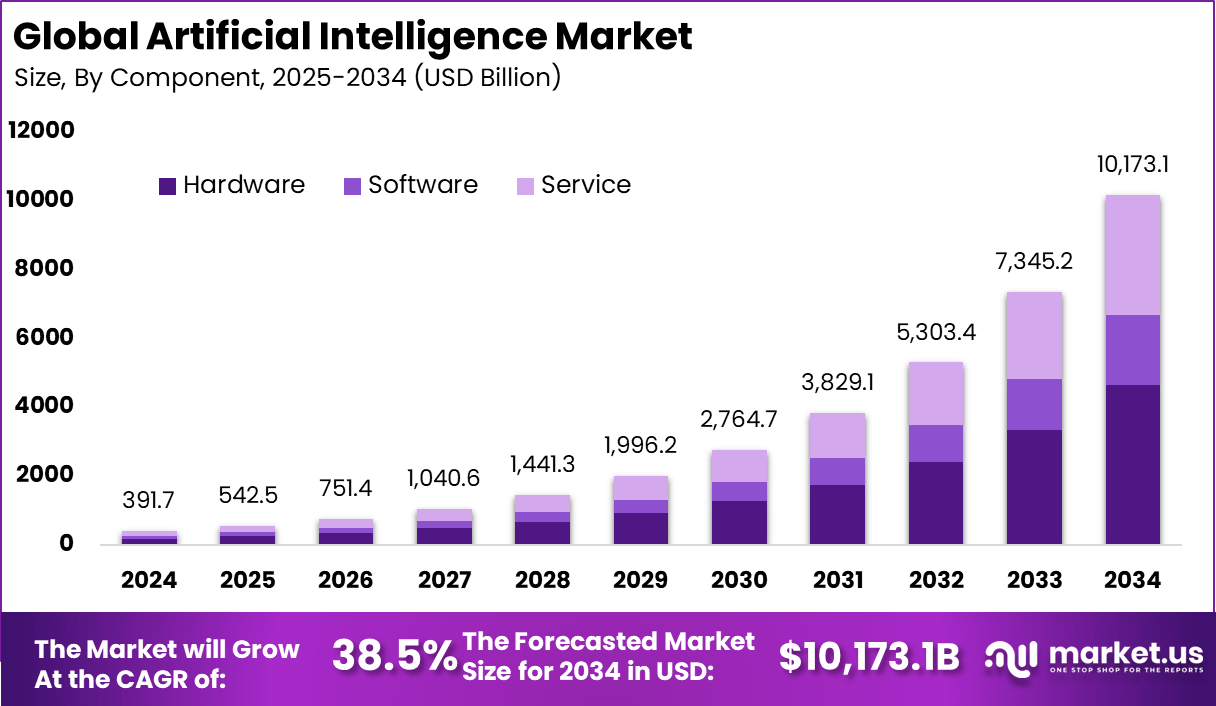
One of the main drivers is the increasing availability of large data sets, which AI systems can analyze to generate valuable insights. Additionally, advancements in computing power, particularly through cloud computing and edge computing, have enhanced AI’s processing capabilities. The growing demand for automation across industries to improve efficiency and reduce operational costs also plays a significant role in market growth.
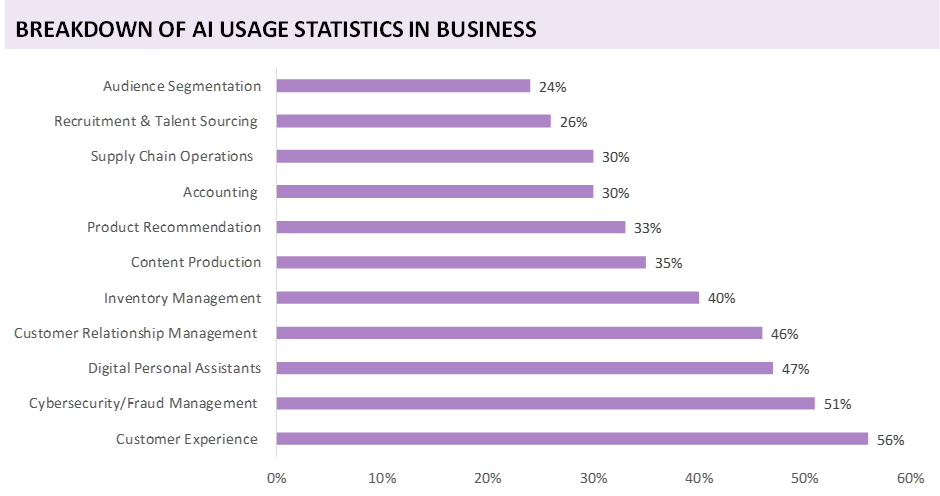
The demand for AI solutions is rising across various industries, driven by the need for more intelligent systems that can streamline operations, enhance customer experiences, and support data-driven decision-making. In sectors such as healthcare, AI is being used for predictive diagnostics and personalized treatments, while in finance, it is employed for fraud detection and algorithmic trading. The automotive industry is leveraging AI for autonomous driving technologies, and retail businesses are utilizing it for personalized marketing and inventory management.
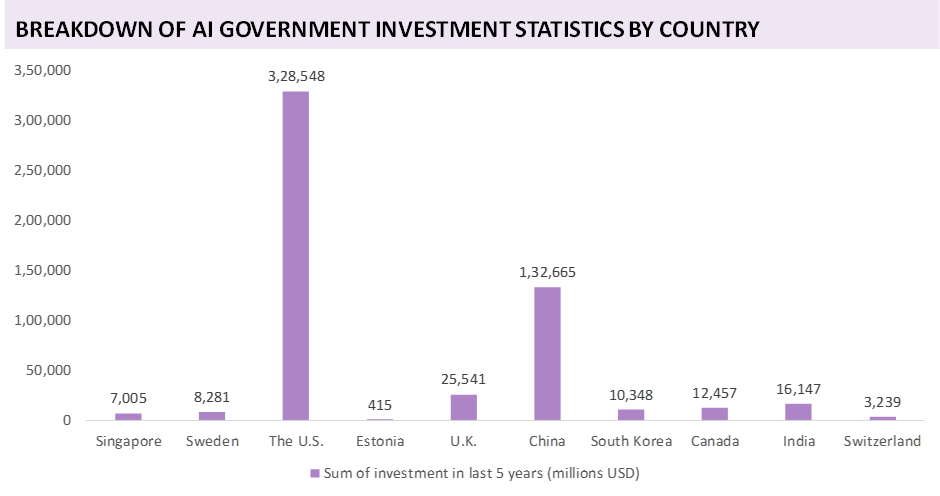
The Artificial Intelligence market is experiencing substantial growth, driven by increased adoption across various sectors including healthcare, automotive, finance, and retail. The proliferation of data and advancements in machine learning models have significantly propelled the AI market forward. Companies are leveraging AI to enhance efficiency, personalize customer experiences, and innovate product offerings.
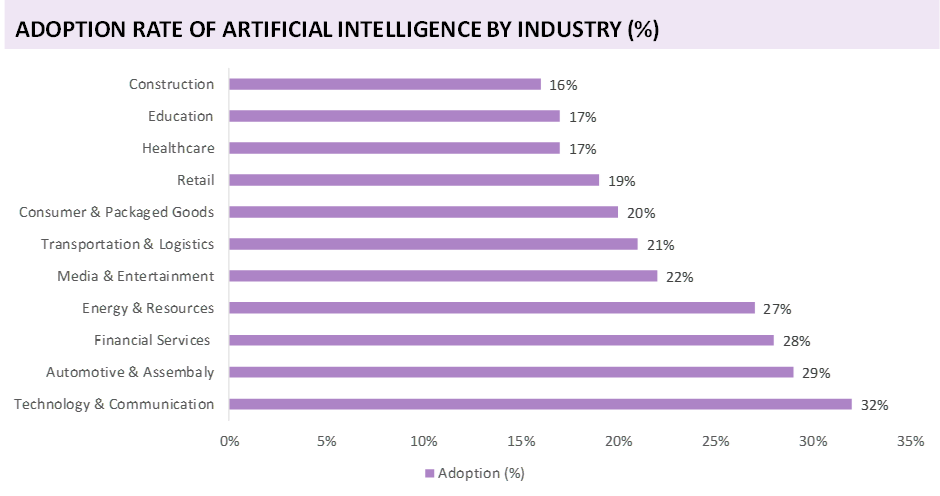
For instance, In December 2023, Google LLC introduced a new large language AI model, Gemini, available in three variants: Gemini Ultra, Gemini Pro, and Gemini Nano. This model distinguishes itself from competitors through its native multimodal capabilities, enabling the processing and generation of text, images, audio, and video data.
According to Forbes Advisor, AI is poised to deliver a 21% net increase to the United States GDP by 2030, underscoring its substantial impact on economic expansion. This projection aligns with findings from our own in-house survey, which anticipates a similar 21% boost to the GDP, reflecting widespread optimism regarding AI’s influence on economic growth.
The rapid uptake of AI technologies is exemplified by ChatGPT, which reached 1 million users within just five days of its launch. A Forbes Advisor survey indicates that 64% of businesses expect AI to significantly enhance their productivity. This statistic highlights the growing confidence among businesses in AI’s capacity to revolutionize operational efficiencies.
Exploding Topics research forecasts that the AI industry’s value will increase by more than 13x over the next six years. By 2025, it is projected that as many as 97 million people will be employed within the AI sector. The AI market size is anticipated to witness an annual growth of at least 120%. Furthermore, 83% of companies regard AI as a critical component of their strategic planning.
Netflix’s use of AI for personalized recommendations generates approximately $1 billion annually in revenue. Around 48% of businesses currently employ AI technologies to effectively harness big data. In the healthcare sector, 38% of medical providers utilize computer-aided diagnostics, showcasing AI’s integration into critical care processes.
Key Takeaways
- The Hardware segment held a 45.6% share of the global AI market.
- Cloud-based deployment led with a 67.8% share.
- Machine Learning (ML) was the top technology, capturing a 43.5% share.
- Healthcare was the leading vertical, accounting for 25.7% share.
- The U.S. AI market was valued at USD 4.67 Billion in 2024, with a 13.7% CAGR.
- North America dominated globally, holding a 34.6% market share.
- China leads AI adoption with 58% of companies actively using AI and 30% evaluating integration.
- In the U.S., only 25% of companies have adopted AI, while 43% are exploring potential applications.
- The World Economic Forum projects 97 million new jobs to be created by AI, offsetting automation-related job losses.
- Accenture forecasts that by 2035, AI could add $3.8 trillion in economic gains to the manufacturing sector.
- A Forbes Advisor survey found 24% of business owners worry about AI’s impact on website traffic.
- In 2023, more than 25% of U.S. startup investments went to AI companies, up from 12% between 2018-2022.
- OpenAI was seeking a valuation of ~$90 billion in late 2023, highlighting investor confidence in generative AI.
- 20% of generative AI users are between 25-34 years old, showing strong adoption among younger professionals.
- The self-driving car industry is projected to surpass $600 billion within five years, driven by autonomous vehicle adoption.
Drivers Impact Analysis
Driver Category Key Driver Description Estimated Impact on CAGR (%) Geographic Relevance Impact Timeline Enterprise scale AI adoption Integration of AI across business operations ~10.8% North America, Europe Short Term Explosion of data volumes Need for advanced analytics and automation ~9.1% Global Short Term Cloud infrastructure maturity Scalable compute for AI workloads ~7.6% Global Mid Term Advances in deep learning models Improved accuracy and applicability ~6.2% Global Mid Term Government AI initiatives National AI strategies and funding ~4.8% North America, Asia Pacific Long Term Risk Impact Analysis
Risk Category Risk Description Estimated Negative Impact on CAGR (%) Geographic Exposure Risk Timeline Data privacy regulations Restrictions on data usage and sharing ~7.4% Europe, North America Short to Mid Term Ethical and bias concerns Trust issues in AI decision systems ~6.1% Global Mid Term Compute cost escalation Rising demand for high performance chips ~5.0% Global Short Term Talent shortages Limited availability of skilled AI professionals ~4.2% Global Mid Term Model explainability limits Regulatory pressure on transparency ~3.3% Global Long Term Restraint Impact Analysis
Restraint Factor Restraint Description Impact on Market Expansion (%) Most Affected Regions Duration of Impact High implementation cost Large upfront AI deployment investments ~6.8% Emerging Markets Short to Mid Term Integration complexity Legacy IT system compatibility ~5.6% Global Mid Term Data quality issues Inconsistent or biased training data ~4.4% Global Mid Term Regulatory uncertainty Evolving AI governance frameworks ~3.7% Europe Long Term Infrastructure constraints Limited access to advanced compute ~2.9% Emerging Markets Long Term US AI Market Size
The US Artificial Intelligence Market was valued at USD 122.19 Billion in 2024, with a robust CAGR of 35.3%. The robust startup ecosystem in the U.S., with strong venture capital backing, also plays a pivotal role in driving innovation and commercializing AI solutions at a faster pace than other regions.
In addition to innovation, North America’s regulatory environment supports AI development. The U.S. and Canada have favorable policies encouraging AI research and adoption. Government initiatives, such as the U.S. National AI Initiative, aim to maintain the region’s competitive edge by fostering collaboration between federal agencies, academia, and the private sector.
For instance, August 2025, the U.S. General Services Administration (GSA) announced the launch of USAi, a secure generative artificial intelligence evaluation suite that enables federal agencies to experiment with and adopt artificial intelligence at scale – faster, safer, and at no cost to them.
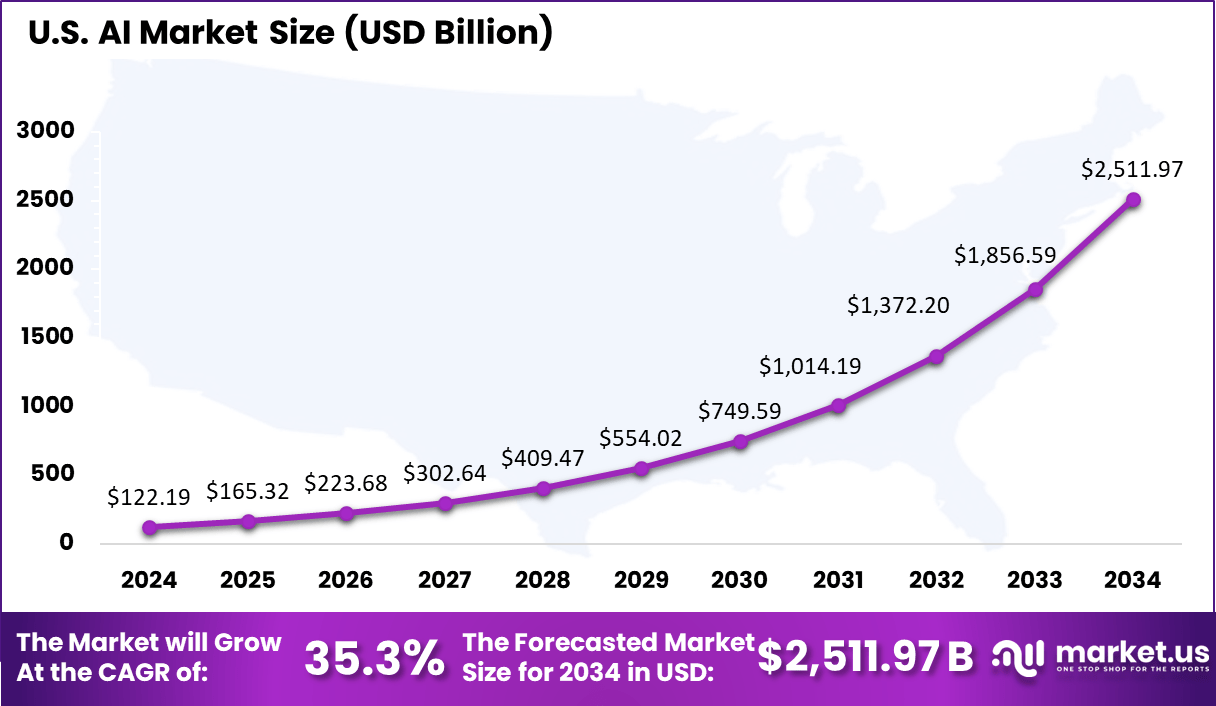
In 2024, North America held a dominant market position in the global Artificial Intelligence Market, capturing more than a 34.6% share. This leadership can be attributed to several key factors. The region has consistently been at the forefront of AI research, driven by a strong innovation ecosystem supported by both the private and public sectors.
Major technology companies like Google, Microsoft, and Amazon, based in the U.S., have made substantial investments in AI, ensuring continuous advancements and adoption across industries. Additionally, the presence of leading AI research institutions and universities further accelerates developments in the field, ensuring that North America remains a global leader in AI technologies.
Furthermore, the high demand for AI applications across diverse sectors such as healthcare, finance, automotive, and retail significantly contributes to North America’s dominant market position. In healthcare, for example, AI-powered tools are revolutionizing diagnostics and patient care, while the financial industry leverages AI for fraud detection, risk management, and automated trading.
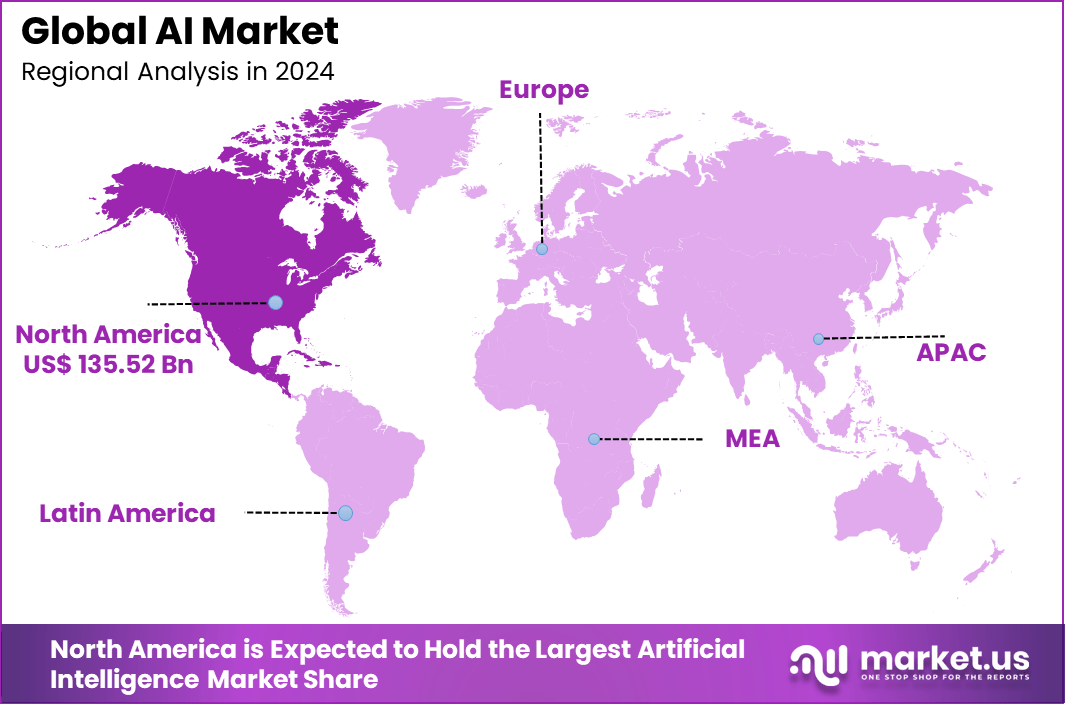
Regional Insights
Region Insight North America Largest market share led by strong innovation hubs, venture funding, and government policies Asia-Pacific Fastest growing region with rising AI adoption in China, India, Japan, and Southeast Asia Europe Growth driven by GDPR-compliant AI systems and investments in digital transformation Other Regions Emerging markets adopting AI for industrial automation, healthcare, and financial inclusion Component Analysis
In 2024, the Hardware segment held a dominant market position, capturing more than a 45.6% share of the Global Artificial Intelligence Market. This segment’s leadership can be attributed to several critical factors that underscore its central role in enabling AI capabilities across various industries. Primarily, software is the foundation of any AI system, providing the algorithms and computational logic that drive AI functionality, from machine learning models to natural language processing and more.
The increasing demand for AI-driven solutions in sectors such as healthcare, finance, and automotive has further propelled the growth of the software segment. Companies are investing heavily in AI software to gain insights from data, automate processes, and enhance decision-making, driving the segment’s growth. For instance, in healthcare, AI software is used for diagnosing diseases with greater accuracy and personalizing treatment plans, thus increasing demand.
Moreover, the evolution of cloud computing has significantly supported the software segment’s dominance by facilitating the accessibility and scalability of AI solutions. Cloud platforms enable businesses to deploy AI solutions without substantial upfront investment in physical infrastructure, thus lowering barriers to entry and accelerating the adoption of AI technologies.
Lastly, continuous advancements in AI software, such as the development of more sophisticated machine learning models and the integration of AI with other emerging technologies like IoT and big data, are expected to sustain the growth of this market segment. As software continues to evolve, becoming more efficient and integrated, its dominance in the AI market is likely to further solidify, supporting more advanced applications and broader adoption.
Deployment Analysis
In 2024, the Cloud-based segment held a dominant market position, capturing more than a 67.8% share of the Global Artificial Intelligence Market. This segment’s substantial market share can primarily be attributed to the scalability, flexibility, and cost-efficiency that cloud-based solutions offer.
Businesses, ranging from startups to large enterprises, are increasingly adopting cloud-based AI to leverage these benefits. The cloud enables companies to access powerful computing resources on-demand without the need for significant capital investments in hardware infrastructure.
The proliferation of data generation and the need for complex data processing have further boosted the dominance of the cloud-based segment. Companies utilize cloud platforms to store and analyze vast amounts of data efficiently, enabling more sophisticated AI applications such as real-time analytics and enhanced machine learning models.
Moreover, the cloud facilitates quicker deployment of AI solutions, which is critical in fast-paced industries needing to rapidly adapt to market changes and consumer demands. Additionally, the ongoing advancements in cloud technology, coupled with improvements in security measures, have made cloud-based AI solutions more appealing.
Enhanced security protocols and compliance measures have addressed many concerns previously associated with cloud deployment, encouraging even the most security-sensitive sectors, like banking and healthcare, to adopt cloud-based AI solutions.
Looking ahead, the cloud-based AI segment is expected to continue its growth trajectory, driven by ongoing technological innovations and increasing integration with other cutting-edge technologies such as the Internet of Things (IoT) and big data. As businesses seek to leverage AI to gain a competitive edge, cloud-based deployment will likely remain a preferred choice due to its ability to provide scalable and efficient AI capabilities.
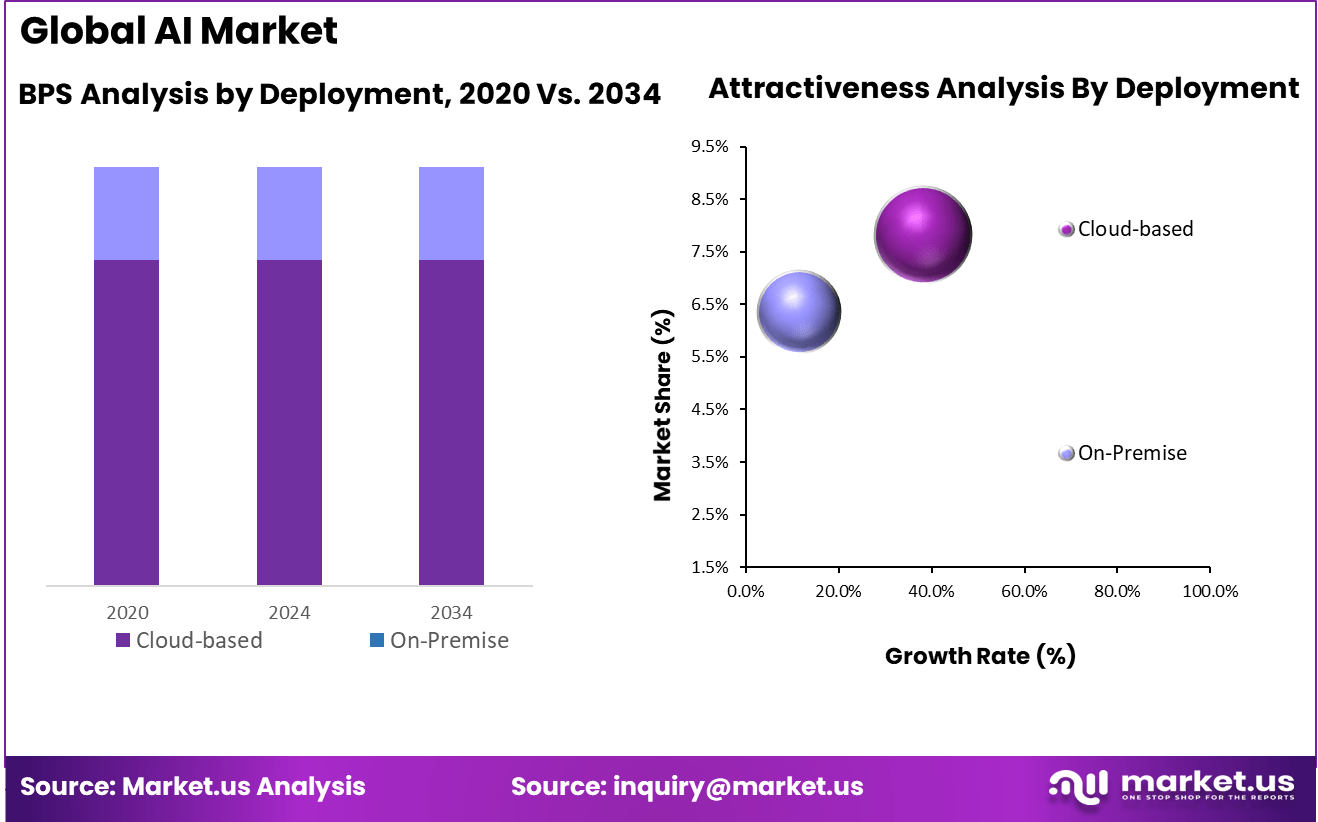
Technology Analysis
In 2024, the Machine Learning (ML) segment held a dominant market position, capturing more than a 43.5% share of the Global Artificial Intelligence Market. This leading status is largely due to ML’s foundational role in powering a vast array of AI applications and services across multiple industries.
Machine Learning algorithms are at the heart of predictive analytics, enabling businesses to make data-driven decisions that enhance operational efficiency and personalized customer experiences. Machine Learning’s ability to learn from and make predictions based on data makes it indispensable for sectors such as finance, healthcare, and retail, where precision and efficiency are crucial.
In finance, ML models are used for fraud detection and risk assessment, while in healthcare, they support diagnostics and patient management systems. The retail industry uses ML for inventory management and customer buying behavior analysis, tailoring marketing strategies effectively.
The scalability of Machine Learning technologies has also contributed significantly to their widespread adoption. As computational power continues to grow, so does the ability to process and analyze larger datasets with greater speed and accuracy, making ML more effective and accessible. Additionally, advancements in ML algorithms have expanded their applicability, not only enhancing existing applications but also enabling new ones, such as autonomous driving and advanced robotics.
Given these dynamics, the Machine Learning segment is poised for sustained growth. Continued investments in R&D, increasing availability of data, and further integration with other emerging technologies like the Internet of Things (IoT) and Edge Computing are expected to drive further expansion and sophistication of ML capabilities, ensuring its ongoing dominance in the AI technology spectrum.
Industry Segment Analysis
In 2024, the Healthcare segment held a dominant market position, capturing more than a 25.7% share of the Global Artificial Intelligence Market. This prominence is primarily driven by the critical need for AI in transforming various aspects of healthcare delivery, from patient diagnostics to management and treatment protocols.
AI technologies, particularly machine learning and natural language processing, are integral in developing predictive models that help in early diagnosis of diseases such as cancer and heart disease, significantly improving patient outcomes.
AI’s ability to analyze vast datasets rapidly accelerates research and development in pharmaceuticals and personalized medicine, enabling more targeted therapy treatments. This capability is invaluable in settings where time and accuracy are critical, such as in intensive care units or emergency responses, where AI-driven systems can predict patient deteriorations before they occur.
Furthermore, the ongoing COVID-19 pandemic has underscored the importance of AI in healthcare, facilitating advanced epidemiological studies and vaccine development. AI applications have been pivotal in managing and analyzing data related to infection rates, treatment efficacy, and in modeling the spread of the virus, thereby supporting public health decisions.
As healthcare continues to evolve, AI is expected to play an increasingly significant role in enabling more efficient, personalized, and proactive healthcare solutions. The demand for AI in healthcare is projected to grow as technologies advance, data accessibility improves, and integration with other healthcare IT solutions expands. This growth is likely to be supported by increasing healthcare expenditures globally, rising focus on data-driven decision-making, and ongoing digital transformation in the healthcare sector.
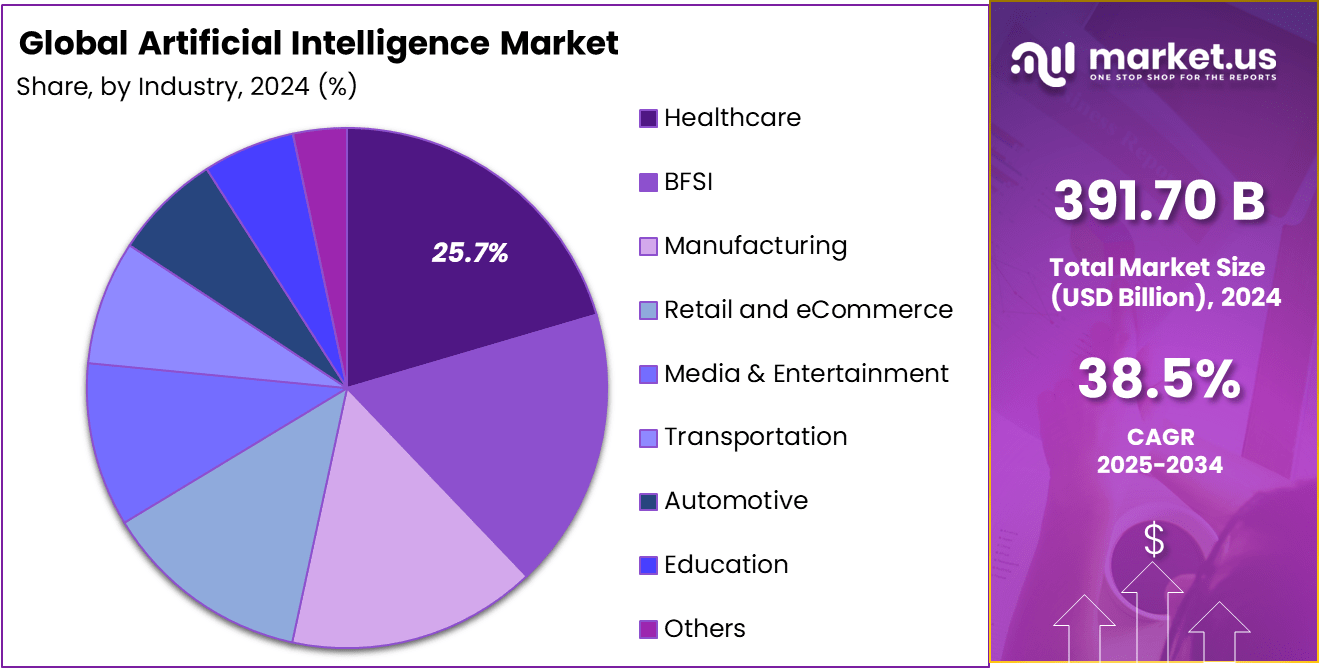
Investor Type Impact Matrix
Investor Type Adoption Level Contribution to Market Growth (%) Key Motivation Investment Behavior Large enterprises Very High ~39% Productivity and automation Platform scale deployment Cloud service providers High ~27% AI infrastructure monetization Capital intensive investment Governments High ~16% National competitiveness Policy backed funding SMEs Moderate ~11% Efficiency and insights Phased adoption Research institutions Low to Moderate ~7% Innovation and experimentation Grant driven Technology Enablement Analysis
Technology Layer Enablement Role Impact on Market Growth (%) Adoption Status Machine learning frameworks Core AI model development ~9.4% Mature GPU and accelerator hardware High performance AI training ~8.1% Growing Cloud AI platforms Scalable AI deployment ~7.3% Mature Data management platforms Training data preparation ~6.0% Growing AI orchestration tools Model lifecycle management ~4.1% Developing Top Growth Factors
Growth Factor Description Democratization via Cloud AI Cloud-native AI platforms reduce barriers to AI adoption and accelerate use case development AI Integration in Enterprise Automation, predictive analytics, personalized services drive industry adoption Advancements in Generative AI Rise of generative AI for content creation, conversational AI, code generation Government and Corporate Investment Significant R&D funding driving innovation and deployment of AI across sectors Increasing Data Availability Big data growth fuels machine learning model accuracy and expansion Key Trends and Innovations
Trend / Innovation Description Generative AI Expansion AI models for text, image, audio, and video generation revolutionize content creation Foundation Models & Transfer Learning Large pre-trained AI models enable fast domain adaptation and reduced development time AI for Automation & Augmentation AI automates knowledge work, customer interaction, and decision-making with AI assistants AI-Driven Analytics & Insights Predictive and prescriptive analytics power enterprise intelligence AI Ethics & Governance Growth Increasing focus on responsible and explainable AI principles AI Hardware & Edge AI Specialized chips and edge processing for faster, privacy-preserving AI computations Key Market Segments
By Component
- Hardware
- Software
- Services
By Deployment
- On-Premise
- Cloud-based
By Technology
- Machine Learning (ML)
- Natural Language Processing (NLP)
- Computer Vision
- Others
By Industry
- Healthcare
- BFSI
- Manufacturing
- Retail and eCommerce
- Media & Entertainment
- Transportation
- Automotive
- Education
- Others
Key Regions and Countries
- North America
- US
- Canada
- Europe
- Germany
- France
- The UK
- Spain
- Italy
- Rest of Europe
- Asia Pacific
- China
- Japan
- South Korea
- India
- Australia
- Rest of APAC
- Latin America
- Brazil
- Mexico
- Rest of Latin America
- Middle East & Africa
- South Africa
- Saudi Arabia
- UAE
- Rest of MEA
Driver Analysis
Increasing Data Availability and Computing Power
A critical driver of AI market growth is the exponential increase in data generation combined with advances in computing power. The proliferation of IoT devices, digital transformation initiatives, and online activities generate vast volumes of structured and unstructured data that feed AI algorithms, improving their accuracy and effectiveness.
Simultaneously, improvements in GPUs, specialized AI chips, and distributed cloud computing enable the processing of complex AI models at scale and speed, making real-time AI applications feasible. This synergy between abundant data and powerful compute resources enables breakthroughs in areas such as natural language processing, computer vision, and predictive analytics.
It also underpins the development of large language models and generative AI, which are key to commercial AI deployment today. The ability to harness massive datasets with scalable compute accelerates AI maturity and adoption across industries and geographies.
Restraint Analysis
Data Privacy Concerns and Talent Shortage
Despite rapid growth, the AI market faces notable restraints including data privacy challenges and significant talent shortages. Privacy concerns arise as AI systems require access to large datasets that may contain sensitive personal or proprietary information. Stricter regulations and societal awareness are increasing scrutiny around data collection, use, and storage, complicating AI implementation and raising compliance costs.
At the same time, there is a scarcity of skilled professionals proficient in AI algorithm development, data engineering, and ethical AI governance. Many organizations struggle to recruit or retain talent capable of designing, training, and maintaining advanced AI solutions. This skills gap coupled with privacy hurdles slows down AI adoption in critical sectors such as healthcare and finance where compliance and accuracy are paramount.
Opportunity Analysis
AI Expansion in Emerging Markets and Language Localization
A substantial opportunity exists in expanding AI capabilities tailored to emerging markets and multilingual environments. While foundation AI models are predominantly trained on English-language internet data, many regions across Asia, Africa, and Latin America require AI systems that understand local languages, dialects, and cultural nuances.
Fine-tuning AI models for language localization and vernacular speech recognition opens new avenues for inclusive AI applications in sectors such as fintech, education, and governance. Local language AI can empower underserved populations by enabling voice-based banking, remote learning through AI tutors, and more efficient multilingual document processing for public services.
Companies focusing on culturally relevant AI innovations gain a competitive edge and access to vast, untapped markets. This opportunity emphasizes AI’s role not just in developed economies, but as a global transformative force embracing linguistic and regional diversity.
Challenge Analysis
Ethical Risks and High Development Costs
The AI market contends with challenges related to ethical risks and the high costs of AI development. Concerns about algorithmic bias, lack of transparency in AI decision-making, and potential misuse generate public and regulatory scrutiny. Ensuring ethical AI deployment that is fair, explainable, and accountable requires investments in governance frameworks, auditing tools, and ongoing monitoring.
Moreover, the creation and training of state-of-the-art AI models demand substantial financial resources including access to massive computational infrastructure and extensive data labeling efforts. These factors create barriers for smaller players and can consolidate market power within a few large incumbents. Balancing innovation with responsible practices and affordability remains a key market challenge impacting AI’s broader societal acceptance and sustainable growth.
5 Prominent AI Use Cases
- Healthcare: AI is transforming healthcare by enhancing remote patient monitoring, streamlining diagnostics through synthetic image generation, and improving medication adherence. These applications help in managing chronic conditions more effectively and in making healthcare more accessible.
- Marketing: In the realm of marketing, AI is significantly impacting social media strategies. Tools powered by AI automate social media scheduling and optimize posting times for maximum engagement. Additionally, AI-driven chatbots are increasingly used for enhancing customer interactions and gathering insightful data to shape future marketing strategies.
- Retail and E-commerce: AI in retail focuses on personalizing the shopping experience. It analyzes customer data to provide tailored product recommendations and optimizes the overall customer journey, from marketing emails to post-purchase engagement.
- Software Development: Generative AI is becoming integral in software development, aiding in tasks such as code generation from templates, bug fixing, and optimizing software performance. This use of AI not only speeds up development cycles but also enhances the consistency and quality of the code.
- Supply Chain Management: AI enhances supply chain efficiency by providing predictive insights and real-time decision support. This includes optimizing inventory levels based on demand forecasts and improving logistical operations through intelligent route planning and delivery schedules.
Key Players Analysis
The AI market is characterized by a dynamic competitive landscape with numerous key players contributing to its rapid growth. Companies such as Alphabet Inc. (Google AI), Microsoft Corporation, and IBM Corporation are recognized as leaders due to their innovative solutions, extensive research and development activities, and strategic partnerships that drive technological advancements and market expansion.
Alphabet Inc., through its Google AI division, has been at the forefront of AI innovation and strategic market maneuvers. Notably, Google AI has made significant acquisitions that enhance its machine learning capabilities and expand its product offerings. Recent product launches, such as advanced AI tools for cloud computing and enterprise solutions, demonstrate Google’s commitment to integrating AI across diverse sectors.
Microsoft Corporation has consistently expanded its AI capabilities through strategic mergers, acquisitions, and product innovations. The acquisition of companies specializing in natural language processing and autonomous systems has bolstered Microsoft’s AI portfolio.
IBM Corporation has a long-standing presence in the AI market, marked by continuous innovation and strategic partnerships. IBM’s focus has been on enhancing its Watson AI capabilities, as evident from its recent acquisitions in the healthcare AI sector. These acquisitions have strengthened IBM’s data analytics and predictive analysis capabilities.
Top Key Players in AI Market
- Alphabet Inc. (Google AI)
- Microsoft Corporation
- IBM Corporation
- Amazon Web Services (AWS)
- NVIDIA Corporation
- Meta Platforms, Inc.
- Intel Corporation
- OpenAI
- Baidu, Inc.
- Tencent Holdings Ltd.
- Salesforce Inc.
- Oracle Corporation
- SAP SE
- Huawei Technologies Co., Ltd.
- Alibaba Group
- C3.ai
- SAS Institute Inc.
- Palantir Technologies
- Siemens AG
- Other Key Players
Recent Developments
- In March 2025, ServiceNow introduced a suite of AI-powered products designed to advance enterprise workflow automation. The portfolio featured AI Agent Studio for no-code agent creation, AI Agent Orchestrator for seamless coordination, and thousands of pre-built AI agents aimed at improving efficiency and reducing resolution times.
- In March 2025, the Commonwealth Bank of Australia expanded its partnership with Anthropic PBC to accelerate AI adoption. The collaboration was structured to enhance customer experiences, strengthen staff support, and ensure access to Anthropic’s expertise in safe and responsible AI development.
- March 2025, NTT DATA Group Corporation broadened its partnership with CrowdStrike, Inc. to enhance its managed cybersecurity services. By integrating CrowdStrike’s AI-native Falcon platform, the collaboration enables stronger threat detection, faster response, and improved prevention, offering clients comprehensive protection against cyber risks.
- In March 2024, NVIDIA introduced a series of new Generative AI Microservices aimed at advancing medical technology, drug discovery, and digital health. These innovative microservices utilize artificial intelligence to enhance healthcare technology, potentially leading to significant improvements in medical research and patient care.
- In April 2024, Microsoft and The Coca-Cola Company started a five-year partnership worth about USD 1.2 billion. They aim to boost Coca-Cola’s technology using Microsoft Cloud and generative AI. This will improve innovation and productivity across Coca-Cola’s global operations.
Report Scope
Report Features Description Market Value (2024) USD 391.70 Bn Forecast Revenue (2034) USD 10,173.05 Bn CAGR (2025-2034) 18.5% Base Year for Estimation 2024 Historic Period 2020-2023 Forecast Period 2025-2034 Report Coverage Revenue Forecast, Market Dynamics, COVID-19 Impact, Competitive Landscape, Recent Developments Segments Covered By Component (Hardware, Software, Services), By Deployment (On-Premise, Cloud-based), By Technology (Machine Learning (ML), Natural Language Processing (NLP), Computer Vision, Others), By Industry (Healthcare, BFSI, Manufacturing, Retail and eCommerce, Media & Entertainment, Transportation, Automotive, Education, Others), and Region Regional Analysis North America – The U.S. and Canada; Europe – Germany, France, The UK, Spain, Italy, Russia, Netherlands & Rest of Europe; APAC- China, Japan, South Korea, India, Australia, New Zealand, Singapore, Thailand, Vietnam & Rest of APAC; Latin America- Brazil, Mexico & Rest of Latin America; Middle East & Africa- South Africa, Saudi Arabia, UAE & Rest of MEA Competitive Landscape Alphabet Inc. (Google AI), Microsoft Corporation, IBM Corporation, Amazon Web Services (AWS), NVIDIA Corporation, Meta Platforms, Inc., Intel Corporation, OpenAI, Baidu, Inc., Tencent Holdings Ltd., Salesforce Inc., Oracle Corporation, SAP SE, Huawei Technologies Co., Ltd., Alibaba Group, C3.ai, SAS Institute Inc., Palantir Technologies, Siemens AG, Other Key Players Customization Scope Customization for segments, region/country-level will be provided. Moreover, additional customization can be done based on the requirements. Purchase Options We have three license to opt for: Single User License, Multi-User License (Up to 5 Users), Corporate Use License (Unlimited User and Printable PDF)  Artificial Intelligence (AI) MarketPublished date: Jan. 2026add_shopping_cartBuy Now get_appDownload Sample
Artificial Intelligence (AI) MarketPublished date: Jan. 2026add_shopping_cartBuy Now get_appDownload Sample -
-
- Alphabet Inc. (Google AI)
- Microsoft Corporation
- IBM Corporation
- Amazon Web Services (AWS)
- NVIDIA Corporation
- Meta Platforms, Inc.
- Intel Corporation
- OpenAI
- Baidu, Inc.
- Tencent Holdings Ltd.
- Salesforce Inc.
- Oracle Corporation
- SAP SE
- Huawei Technologies Co., Ltd.
- Alibaba Group
- C3.ai
- SAS Institute Inc.
- Palantir Technologies
- Siemens AG
- Other Key Players













